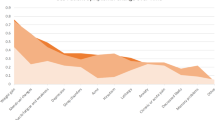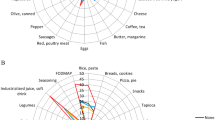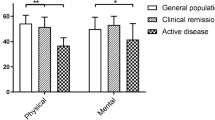Abstract
Aim
As healthcare providers for Crohn’s disease, we assume that we have a good understanding of the disease progression and its symptoms. The aim of this study was to gather information about what patients with Crohn’s disease think are relevant to their symptoms and what helps them cope with this lifelong benign disease.
Materials and methods
A questionnaire was sent to all patients with a diagnosis of Crohn’s disease seen in the Digestive Disease Center in the last 5 years. The returned forms were downloaded into a database and sent for analysis.
Results
Sixty-two percent of respondents were female. One third were between the ages of 35 and 50 years. Seventy percent were married. Thirty-eight percent had a graduate degree, 19% were unemployed. Fifty percent still smoked, half of them less than one pack a day. Sixty-eight percent said that their symptoms affected work, and one fourth changed jobs due to this. Foods worsened symptoms in 60%, with a decrease in symptoms while on low fiber foods and white meats. Lifestyle change worsened symptoms in 66%. A change in the caregiver was not a significant stressor. More than half used Remicade, with one third stating that it was helpful. Eight percent had never used steroids. Alcohol increased symptoms in 40%. Factors that did not cause a significant change were children at any age, pregnancy, menopause, and hormone replacement therapy. Surgery caused half the patients to improve for many years, although one third felt a lowered self-esteem postoperatively.
Conclusion
Patients with Crohn’s disease should be managed in a more comprehensive manner to provide optimal care. Thus, a team approach that includes a dietician and counselor should be considered as an integral part of this team. This will allow patients to have enhanced skills to cope with changes in their symptoms, whether they are due to the disease itself or the changes in their routine.









Similar content being viewed by others
References
Mitchell A, Guyatt G, Singer J et al (1988) Quality of life in patients with inflammatory bowel disease. J Clin Gastroenterol 10:306–310
Drossman DA, Patrick DL, Mitchell CM et al (1989) Health related quality of life in inflammatory bowel disease. Dig Dis Sci 34:1379–1386
Bernkley T, Johnson J, Lygren I et al (2005) Health related quality of life in patients with inflammatory bowel disease measured with the Short Form-36: psychometric assessment and a comparison with general population norms. Inflamm Bowel Dis 11(10):909–918
Cohen RD (2002) The quality of life in patients with Crohn’s disease. Aliment Pharmacol Ther 16:1603–1609
Mussell M, Bocker U, Nagel N, Singer MV (2004) Predictors of disease related concerns and other aspects of health related quality of life in outpatients with inflammatory bowel disease. Eur J Gastroenterol Hepatol 16(12):1273–1280
Ringel Y, Drossman DA (2001) Psychosocial aspects of Crohn’s disease. Surg Clin North Am 81(1):231–252
Garrett VD, Brantley PJ, Jones GN, McKnight GT (1991) The relation between daily stress and Crohn’s Disease. J Behav Med 14(1):87–96
North CS, Alpers DH, Heltzer JE et al (1991) Do events or depression exacerbate inflammatory bowel disease? Ann Intern Med 114:381–386
Bregenzer N, Lauge A, Furst A et al (2005) Patient education in inflammatory bowel disease does not influence patients knowledge and long term psychosocial well being. Gastroenterology 43(4):367–371
Blondel-Kucharski F, Chircop C, Marquis P et al (2001) Health related quality of life in Crohn’s disease: a prospective longitudinal study in 231 patients. Am J Gastroenterol 96(10):2915–2920
Canavan C, Abrams KR, Hawthorne B et al (2006) Long-term prognosis in Crohn’s disease: factors that affect quality of life. Aliment Pharmacol Ther 23:377–385
Russel MG, Nieman FH, Bergers JM et al (1996) Cigarette smoking and quality of life in patients with inflammatory bowel disease. Eur J Gastroenterol Hepatol 8:1075–1081
Delaney CP, Kiran RP, Senagore AJ et al (2003) Quality of life improves within 30 days of surgery for Crohn’s disease. J Am Coll Surg 196(5):714–721
Tillinger W, Mittermiller C, Lochs H, Moser G (1999) Health-related quality of life in patients with Crohn’s disease. Dig Dis Sci 44(5):932–938
Wyke RJ, Edwards FC, Allan RN (1988) Employment problems and prospects for patients with inflammatory bowel disease. Gut 29(9):1229–1235
Traue HC, Kosarz P (1999) Everyday stress and Crohn’s disease activity. A time series analysis of 20 single cases. Int J Behav Med 6(2):101–119
Garcia-Vega E, Fernandez-Rodrigues C (2004) A stress management programme for Crohn’s disease. Behav Res Ther 42:367–383
Jantschek G, Zeitz M, Pritsch M et al (1998) Effect of psychotherapy on the course of Crohn’s disease. Results of the German prospective multicenter psychotherapy treatment study on Crohn’s disease. Scand J Gastroenterol 33(12):1289–1296
Schwarz SP, Blanchard EB (1991) Evaluation of a psychological treatment for inflammatory bowel disease. Behav Res Ther 29:167–177
Mardini HE, Kip KE, Wilson JW (2004) Crohn’s disease: a two-year prospective study of the association between psychological distress and disease activity. Dig Dis Sci 49(3):492–497
Cross RK, Wilson KT, Binion DG (2005) Narcotic use in patients with Crohn’s disease. Am J Gastroenterol 100:2225–2229
Author information
Authors and Affiliations
Corresponding author
Rights and permissions
About this article
Cite this article
Zutshi, M., Hull, T.L. & Hammel, J. Crohn’s disease: a patient’s perspective. Int J Colorectal Dis 22, 1437–1444 (2007). https://doi.org/10.1007/s00384-007-0332-9
Accepted:
Published:
Issue Date:
DOI: https://doi.org/10.1007/s00384-007-0332-9




